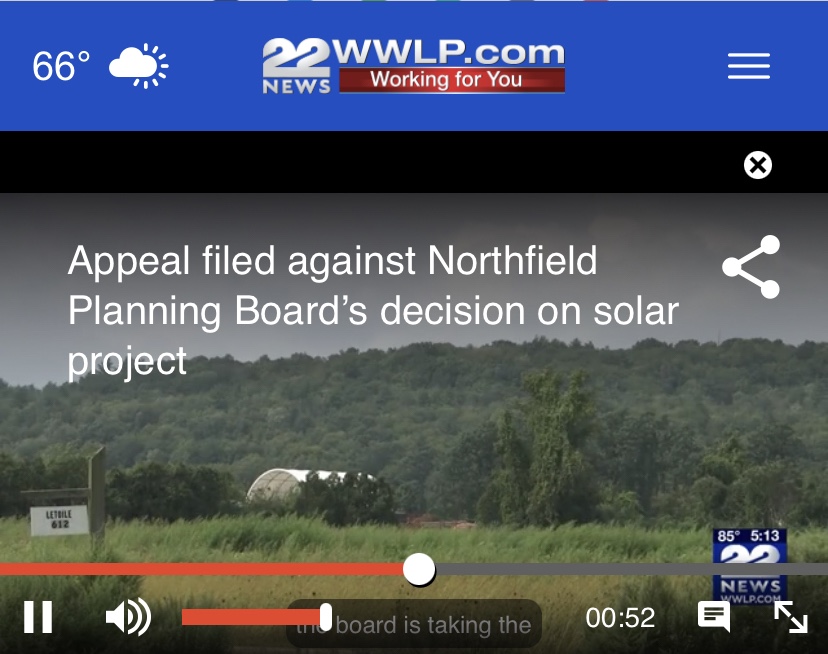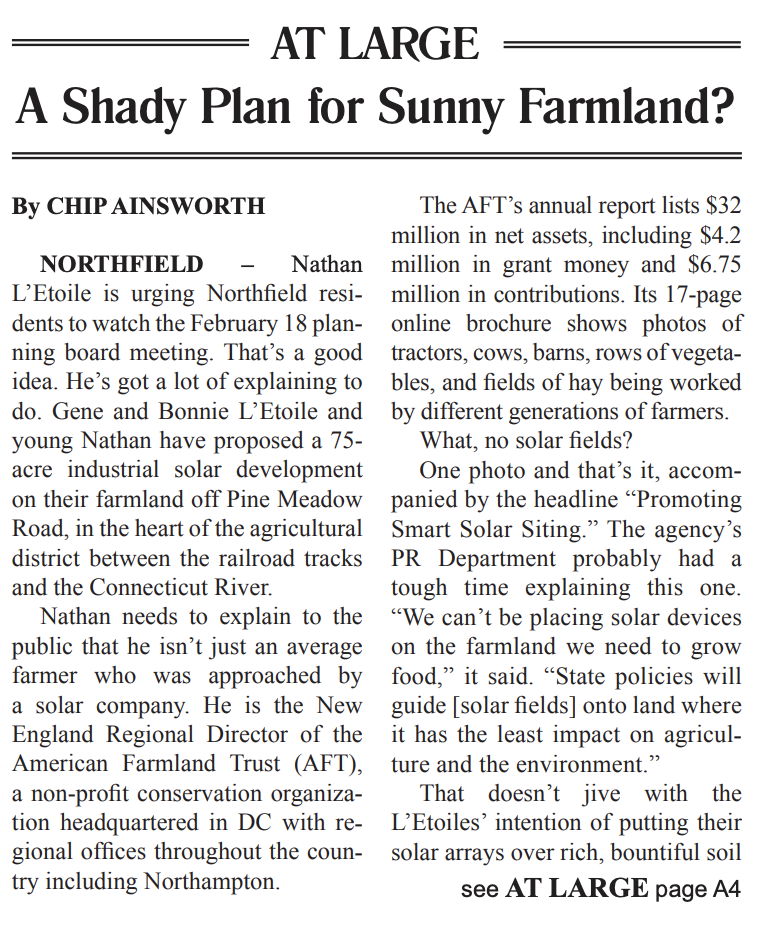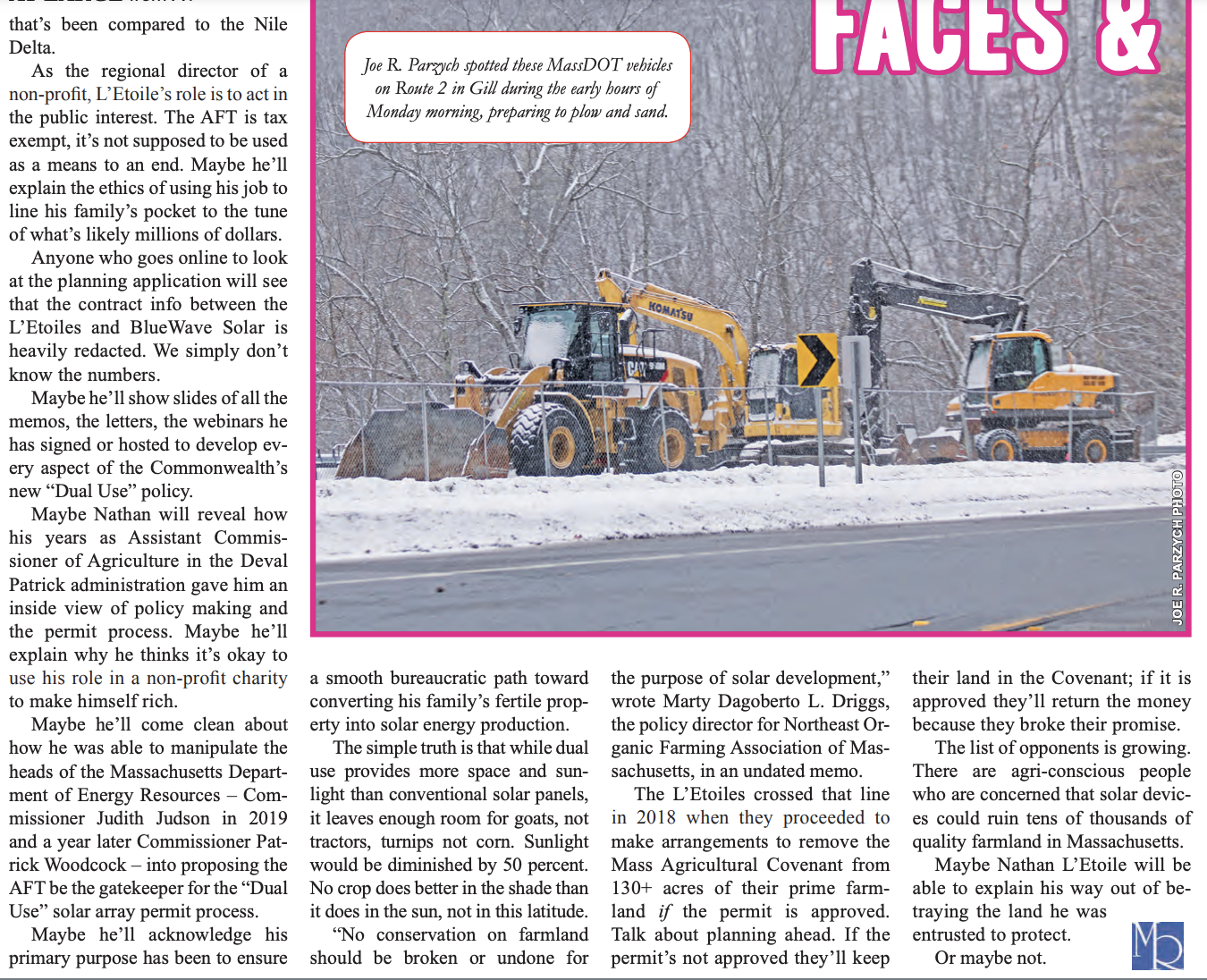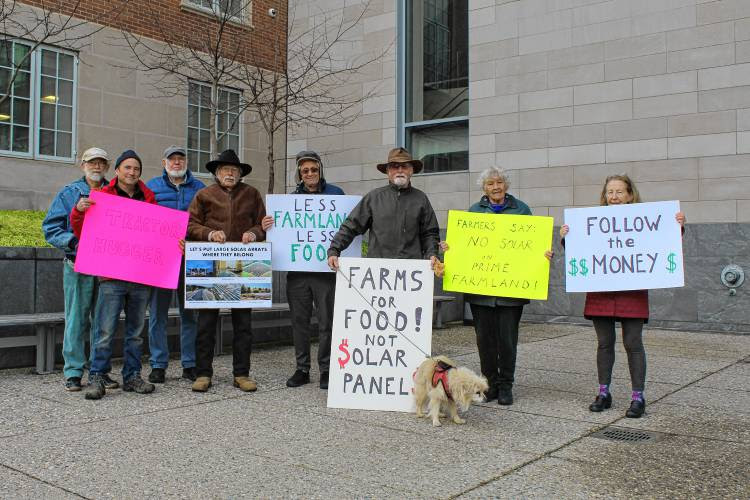August 12, 2022 Affidavit of Scott W. Horsley, a water resource consultant and William Powers, owner of Powers Engineering:
April 12, 2022 Franklin Superior Court Judge Francis E. Flannery rejects Blue Wave Solar effort to dismiss lawsuit by local residents challenging 72-acre ground mounted solar and battery storage facility in Northfield Farms neighborhood.
Northfield: Breaking News /Northfield Appeal Filed
Read more about the cultural significance of this site at www.nayyag.com and how Massachusetts Historical Commission is not adequately protecting Indigenous cultural sites from industrial developments like this.

A Shady Plan for Sunny Farmland in Northfield, MA


Lawsuit challenging Blue Wave Solar Project on Prime Farmland Gets Hearing in Greenfield MA
Farms for Food not Solar Panels, Say Opponents
The Franklin County Superior Court heard arguments on an appeal of three special permits issued in May 2021 by the Town of Northfield (MA) Planning Board for solar developer Blue Wave Solar. The permits would allow 69 acres of prime Connecticut River agricultural land to be converted to an industrial scale solar project with 26,000 solar panels, batteries, transformers and inverters.
The appeal was brought by local resident and neighbor Chris Kalinowski and the non-profit organization Restore: The North Woods. The defendants are the town Planning Board, the land owners, and Blue Wave in the complaint.
There were four main legal arguments during the hearing:
(1) Whether plaintiffs Chris Kalinowski and Restore: The North Woods have legal standing to appeal the permits;
(2) Whether each member of the Planning Board was eligible to vote on Blue Wave’s permit applications;
(3) Whether the Planning Board’s decisions are procedurally deficient for lack of required findings; and
(4) Whether the proposed solar project satisfies the special permit criteria in the Town’s Zoning Bylaw—including whether the project would significantly alter the surrounding neighborhood.
The solar project would be subsidized under the Massachusetts Department of Energy Resources (DOER) SMART program that shifts electricity rate payer money to solar projects. Industrial solar projects on agricultural land, called “dual-use”, get added incentives. Some estimate one acre of solar on farmland generates $1 million in profits over 20 years. The Northfield project could generate up to $69 million in profits over 20 years.
The project is being pursued at a time when there is a state-wide backlash against industrial solar. On October 27, 2022, a grassroots coalition delivered a petition signed by 1.400 people to Governor Baker’s office. It called for a temporary limit on electricity subsidies for solar projects that clear-cut forests, use prime farmlands, and harm Indigenous cultural sites, among other things.
Attorney Meg Sheehan, co-counsel for the plaintiffs, referred to a “tidal wave” of opposition across Massachusetts. “Industrial solar on our food-producing agricultural lands is an unproven experiment,” said Sheehan. “Even the industry admits we don’t know if crops will grow, and if they do, yields are reduced according to studies so far. Northfield’s agricultural character and farms are at the core of its community identity. How can an industrial project in a farming community in a residential area be consistent with local zoning?”
Groups claim it’s the subsidies that are driving this development, and there is no DOER oversight for the solar on farmland, like in Southeastern Massachusetts where arsenic-laced wood solar panel poles have been installed in the sole source drinking water aquifer on cranberry bogs.
The solar industry got more tax breaks through a clause in the Massachusetts “DRIVE” climate bill this year that lets the land where these industrial projects are built be taxed as farmland. “This means drastically lower tax revenues for municipalities in cash-strapped times. This solar on farm land is a financial boondoggle for the corporate solar industry and a loss for municipalities and our food systems,” said Sheehan.
The project site in Northfield, in an area known as Northfield Farms, has significant archeological history as well as being prime farmland. It is one of over a dozen areas throughout the state where solar has destroyed or is threatening Indigenous cultural sites. “In Southeastern Massachusetts agriculture or “site preparation” for solar is removing 30,000 years of glacial deposits that hold the history of the Wampanoag people and the Massachusetts Historical Commission’s abysmal failure to protect Indigenous cultural sites is utterly shocking,” said Sheehan. “Massachusetts Historical Commission has also dropped the ball at the Blue Wave site in Northfield,” said Sheehan.
Harvard trained biologist and Wendell resident Bill Stubblefield questions the Massachusetts push for large scale solar in the face of climate change. “Our future is in grave jeopardy from the unprecedented threat of Runaway Climate Disruption, and solar power is important in meeting this challenge. But so are our forests and farms. Forests are uniquely important for biodiversity and natural carbon sinks that remove vast amounts of CO2 from the atmosphere. And farms are equally important as providers of wholesome local food from our precious soils, especially those along the Connecticut that have nourished humans for thousands of years. It is dangerously shortsighted to damage these invaluable resources without first utilizing the vast potential of roof tops, parking lots, and similar sites as well as brownfields and other degraded lands.”
Plainfield resident Ed Stockman is a biologist, consultant, researcher and fourth generation farmer who co-founded Regeneration Massachusetts. “Most food consumed in Massachusetts is grown out of state. If climate scientists are correct, growing conditions and thus crop yields in food producing regions of the US will be significantly negatively impacted by climate change. This will likely mean less food imported to Massachusetts, making locally grown food that much more important. I would say for most people, food will be paramount compared to electricity. Solar arrays on prime farmland, like Northfield Farms, is folly considering our future food needs.
Kiffer Sikes lives in Northfield. ” As a resident of Northfield, I am concerned that Northfield is on the verge of losing valuable farmland for the development of large solar arrays. These arrays threaten local food production, the agricultural economy, and the intrinsic and financial value that comes from Northfield’s rural character.”
“We need to shift subsidies toward solar done right and not kill the planet trying to save it” said Sheehan.
The case received front-page coverage in the Greenfield Recorder:

GREENFIELD — A Franklin County Superior Court judge has taken arguments under advisement following a hearing seeking to appeal the special permits for three solar arrays that were approved for Pine Meadow Road in Northfield.
Judge Karen Goodwin said she will issue a decision on whether the appeal process should proceed as soon as possible following Monday morning’s hearing, during which the solar company’s attorney argued that the plaintiffs — abutter Christopher Kalinowski and the environmental nonprofit RESTORE: The North Woods — could not identify a “concrete, particularized injury” as a result of the solar arrays’ approval.
“It is Mr. Kalinowski’s burden — and on a higher level, RESTORE — to show that they are suffering particular and individualized injuries,” said Ryan O’Hara, the attorney representing BlueWave Solar. “It needs to be special and different from what happens to the community.”
Kalinowski and RESTORE, however, argue the Planning Board’s approvals in July 2021 should be overturned because the board allegedly violated the Mullin Rule, which dictates whether a board member who missed part of a hearing can participate at future ones; the board allegedly does not have the authority to issue special permits for large solar arrays; and the board allegedly failed to make proper findings under the zoning bylaws to support approval of the special permits.
Kalinowski’s appeal, which was filed in September 2021, follows the Northfield Planning Board’s approval of conditions for special permits for the three solar arrays. In total, the project is estimated to cost $20 million for construction and will consist of about 76 acres of solar arrays installed across three tracts of land owned by the L’Etoile family and Hopping Ahead LLC.
“Array A,” which Kalinowski abuts, is the largest of the three arrays at roughly 26 acres and will be located north along Pine Meadow Road, beyond Riverview Road. “Array B” will be located across from the Four Star Farms main building. A third, smaller array, “Array C,” will be on the Connecticut River side of Pine Meadow Road.
The core of O’Hara and BlueWave Solar’s argument is that the plaintiffs lack the legal standing to appeal all three arrays because Kalinowski only directly abuts Array A, while RESTORE, a nonprofit membership organization, had “no presence in Northfield,” until just before the appeal was filed when residents signed up, according to O’Hara.
O’Hara emphasized again that Kalinowski and RESTORE’s argument does not show individual injuries posed to them and that any harms from the project, if any, would affect the entire community, not just Kalinowski. The amended civil complaint filed with Franklin County Superior Court focuses several paragraphs on “Array A,” which, if built, will cause Kalinowski to “suffer a loss of the rural and agricultural values and aesthetic of the scenic country setting” of his neighborhood, while also negatively affecting “prime farmland.”
In court on Monday, attorney Ethan Dively, who is representing Kalinowski, said the large arrays being put up on one road will certainly change the “hyperlocal” neighborhood of Pine Meadow Road.
According to Dively, Northfield had not at the time approved an exception to the Mullin Rule — allowing a board member who missed a hearing to vote on a permit by watching a video recording and reading meeting notes — meaning that Planning Board member Tammy Pelletier, who missed a portion of the Feb. 18, 2021 meeting, should not have been able to vote on the permits, thus denying the supermajority needed to approve the projects. Pelletier, who was deposed earlier in the appeal process, and court documents submitted by BlueWave Solar’s attorneys, say that Pelletier only missed introductions at the hearing and had signed on right as the presentation was beginning.
Dively also suggested the Zoning Board of Appeals should have handled these permits because BlueWave Solar’s arrays are located outside of the Solar Overlay District. Northfield’s bylaws direct the Planning Board to handle solar arrays located inside the overlay, but do not have specific language for facilities outside the overlay. Goodwin, however, suggested that if there is no clear language, then maybe the Planning Board should take responsibility for arrays outside the overlay because it already has the experience.
Northfield Town Counsel Jeffrey Blake said town policy when it comes to assigning permitting authority in cases like this comes down to boards communicating with one another.
Closing out the plaintiffs’ argument, Dively said the Planning Board failed to make proper findings in its conditions for approving the permits. More specifically, Dively said the board found the project will “have adverse effects (that) overbalance its beneficial effects on the town.” O’Hara said this was a scrivener’s error, but Dively said it was not fixed.
“Whether it’s a scrivener’s error or not, it wasn’t corrected,” Dively said. “On this basis, a remand is appropriate so the board can make a proper finding.”
If Goodwin feels the Planning Board acted within the proper channels to come to its decision, then Dively said he is hopeful his client will get a chance to continue the process through a trial.
“What we’re asking for, your Honor, is Mr. Kalinowski gets his day in court,” Dively said.Protest of solar arrays outside court
Before Monday’s hearing, a group of residents, farmers and environmental advocates stood outside the Franklin County Justice Center to show their opposition to solar arrays being sited on “prime farmland” across Massachusetts. Prime farmland, as designated by the U.S. Department of Agriculture, is “land that has the best combination of physical and chemical characteristics for producing food, feed, forage, fiber and oilseed crops, and that is available for these uses.”
Outside the courthouse, the group raised concerns about potential negative effects the construction of solar arrays could have on farmland, especially as the need for food will only continue to rise.
“We’re going to need food as regions of the country dry up and flood out,” Plainfield resident and fourth-generation farmer Ed Stockman said of the effects climate change will bring. “I don’t want to give anyone the impression we don’t want clean energy. What we need to do is put it on these buildings.”
“We could have solar on that roof, that roof or this roof,” added Wendell resident Jim Thornley, pointing to the roofs of All Souls Church, the Greenfield Recorder offices and the Franklin County Justice Center. “If (green energy sources were) dispersed, we could cut down the need for these giant plants.”
Fred Beddall, a Northampton farmer for 25 years, agreed with Stockman that local communities need to continue to grow their own food.
“We need to grow more food in Massachusetts, not less,” Beddall said. “I’m very concerned about losing prime farmland. … Putting solar on it downgrades its ability to grow food.”
Solar, Beddall said, is a “great accessory use” for farms, but it can limit what farmers can grow or produce on the land. Instead, alternative locations should be sought out for solar panels so operations can be “farm-first.”
The BlueWave Solar project continues as environmental advocates across the state pushback against industrial solar operations. In October, a petition, created by Greenfield-based Save Massachusetts Forests, was delivered with more than 1,500 signatures to Gov. Charlie Baker requesting a moratorium on state subsidies for large-scale solar projects.
Shelburne Falls resident Janet Sinclair, who helped organize Monday’s protest, said their main goal is to “call attention to this issue.”
“It’s not just about Northfield, but why are we having large-scale solar on our farmland,” Sinclair said.
In the future, she said the focus will be on continuing to inform the public about large-scale solar arrays in the state.
“These people will continue to do that, continue to do public education,” Sinclair explained. “We’re always paying attention if this is happening in any town.”
Chris Larabee can be reached at clarabee@recorder.com or 413-930-4081.
